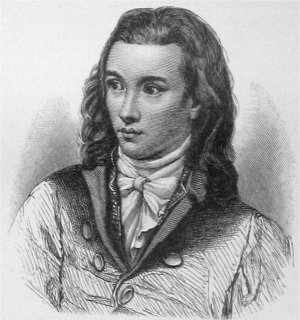Fichte Studies § 556
Novalis Quotes
“Everywhere we seek the Absolute, and always we find only things.”
Fragment No. 1; Variant: We seek the absolute everywhere and only ever find things.
Blüthenstaub (1798)
Ralph Waldo Emerson in "Goethe; or, the Writer" writes of this passage, and quotes a slightly different translation: The ardent and holy Novalis characterized the book as "thoroughly modern and prosaic; the romantic is completely levelled in it; so is the poetry of nature; the wonderful. The book treats only of the ordinary affairs of men: it is a poeticized civic and domestic story. The wonderful in it is expressly treated as fiction and enthusiastic dreaming:" — and yet, what is also characteristic, Novalis soon returned to this book, and it remained his favorite reading to the end of his life.
Novalis (1829)
“Pure mathematics is religion.”
Reine Mathematik ist Religion.
Blüthenstaub (1798), Unsequenced
Novalis here alludes to Plutarch's account of the shrine of the goddess Minerva, identified with Isis, at Sais, which he reports had the inscription "I am all that hath been, and is, and shall be; and my veil no mortal has hitherto raised."
Pupils at Sais (1799)
“We are on a mission: we are called to the cultivation of the earth.”
Fragment No. 32; Variant translations: We are on a mission.We are called to form the earth.
We are on a mission.We are called to educate the earth.
Blüthenstaub (1798)
“Man is a sun and his senses are the planets.”
Blüthenstaub (1798), Unsequenced
Variant: Man is a sun and his senses are the planets.
Pupils at Sais (1799)
“Where children are, there is a golden age.”
Fragment No. 97
Blüthenstaub (1798)
“The poem of the understanding is philosophy.”
“Logological Fragments,” Philosophical Writings, M. Stolijar, trans. (Albany: 1997) #24
Pupils at Sais (1799)
Fragment No. 109
Blüthenstaub (1798)
“Fate and temperament are the names of a concept.”
As quoted in Demian (1972) by Hermann Hesse, trans. W.J. Strachan
Wahrhafte Anarchie ist das Zeugungselement der Religion. Aus der Vernichtung alles Positiven hebt sie ihr glorreiches Haupt als neue Weltstifterin empor...
English translation as quoted in The Dublin Review Vol. III (July-October 1837); The original German is quoted http://www.jlrweb.com/whiterose/leaffourger.html from the Fourth Leaflet http://www.jlrweb.com/whiterose/leaffoureng.html of the White Rose (1942)
Variant translation: True anarchy is the generative element of religion. Out of the annihilation of every positive element she lifts her gloriously radiant countenance as the founder of a new world.
Fragment No. 105
Blüthenstaub (1798)
“Philosophy … bears witness to the deepest love of reflection, to absolute delight in wisdom.”
“Logological Fragments,” Philosophical Writings, M. Stolijar, trans. (Albany: 1997) #12
“Only the most perfect human being can design the most perfect philosophy.”
Fichte Studies § 651
Pupils at Sais (1799)
Fragment No. 88
Blüthenstaub (1798)
Die Möglichkeit aller Philosophie ... dass sich die Intelligenz durch Selbstberührung eine Selbstgesezmäßige Bewegung - d.i. eine eigne Form der Tätigkeit gibt.
Schriften, p. 63, as translated in Walter Benjamin: Selected Writings: Volume 1, 1913-1926 (1996), p. 133
Metaphysics, again, is the Dynamics of Thought; treats of the primary Powers of Thought; occupies itself with the mere Soul of the Science of Thinking. Metaphysical ideas stand related to one another, like thoughts without words. Men often wondered at the stubborn Incompletibility of these two Sciences; each followed its own business by itself; there was a want everywhere, nothing would suit rightly with either. From the very first, attempts were made to unite them, as everything about them indicated relationship; but every attempt failed; the one or the other Science still suffered in these attempts, and lost its essential character. We had to abide by metaphysical Logic, and logical Metaphysic, but neither of them was as it should be.
Pupils at Sais (1799)
“Someone arrived there — who lifted the veil of the goddess, at Sais.”
But what did he see? He saw — wonder of wonders — himself.
Novalis here alludes to Plutarch's account of the shrine of the goddess Minerva, identified with Isis, at Sais, which he reports had the inscription "I am all that hath been, and is, and shall be; and my veil no mortal has hitherto raised."
Pupils at Sais (1799)
The highest statement of cognition must be an expression of that fact which is the means and ground for all cognition, namely, the goal of the I.
Fichte Studies § 556
